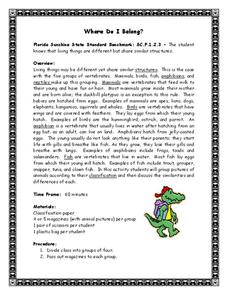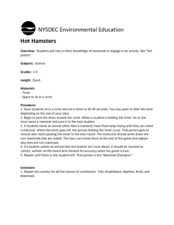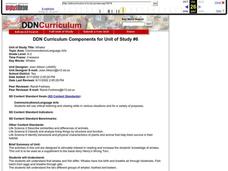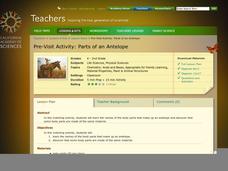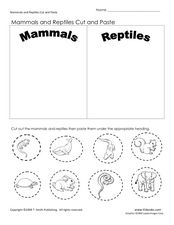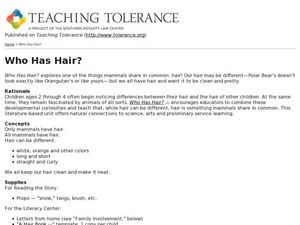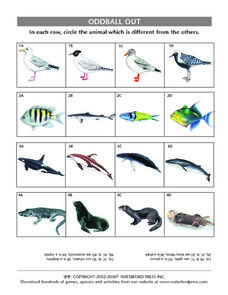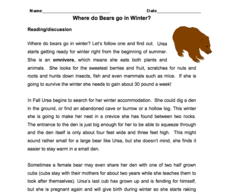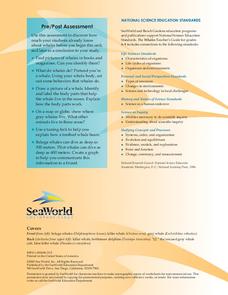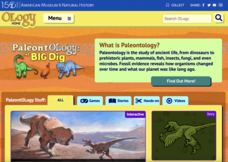Curated OER
Prairie Ecology Internet Activity
In this prairie ecology worksheet, learners respond to 11 questions that require them to consult selected Internet sources and answer questions about prairie animals and their habitats.
Curated OER
Where Do I Belong?
Fourth graders work in groups. They are given magazines. Students cut pictures of five mamals, five birds, five reptiles, five amphibians, and five fish. They place the pictures in a plastic bag. Students switch bags. They are explained...
Curated OER
Are you an Animal Sleuth?
Students define and identify both wild and domestic animals as well as mammals and non-mammals. In this animal safety lesson, students distinguish between animals that can carry rabies from those that cannot. Students use stuffed animals...
Curated OER
What Is Happening To My Species?
Learners select and research an animal that lives in the rainforest of Manu, Peru. They watch and discuss a video, create masks and costumes to role-play various rainforest animals, conduct research, and write a short story of their...
Curated OER
Hot Hamsters
Using this quick activity, you can have your class review what they have learned about mammals. Learners sit in a circle, and take turns naming a mammal. This activity could be enriched by having learners go to their desks, identify a...
Curated OER
Whales
Students compare the differences between whales and fish. They examine the differences of toothed and baleen whales. They identify behavioral and physical characteristics of animals that help them survive in their habitat.
Curated OER
Phylum Chordata
All major groups of vertebrates are summarized here with the characteristics of each explained. Other subphyla of chordates are listed: cephalochordata, urochordata, monotremata, marsupialia. The details are relevant but are not linked...
Curated OER
Quiz (Animals)
In this science worksheet, pupils complete an 8 question true/false quiz about animals. These are specific questions about common animals. The answers are upside down on the page.
Curated OER
Animals Vocabulary List and Definitions
In this animal words worksheet, students match 15 words pertaining to animals to their definitions in another column. These definitions are related to the general animal kingdom.
Curated OER
Skulls Tell It All
Skulls tell it all, and with this lesson plan, you will tell it all to your class! Youngsters view animal skulls, analyzing the shape of teeth and the placement of the eye sockets. They associate these adaptations with the types of food...
California Academy of Science
Parts of an Antelope
There are so many wonderful parts to an animal: fur, antlers, tails, and legs, to name a few. A large diagram of an antelope is used to start a matching game, where the class matches body parts made of the same material. They discuss...
T. Smith Publishing
Mammals and Reptiles Cut and Paste
Adorable! Most children are really drawn to animals. With this worksheet, they cut out eight darling drawings of animals and then affix each to a page divided in half according to whether it is a mammal or a reptile. If you need it, an...
Curated OER
Animals In Winter
Students read story Animals in Winter, and explore similarities and differences in how humans and other animals prepare for survival in winter. Students create class book that compares and illustrates different ways humans and animals...
Curated OER
Who Has Hair?
Students explore similarities and differences. In this Teaching Tolerance activity, students read literature and participate in activities that features mammals and their hair. Students learn that they share things in common while we are...
Curated OER
Desert Animals
Students survive within an ecosystem, an animal must be physically and behaviorally adapted to the conditions of its environment.
Curated OER
Investigation 10 - Mammal Oral Reports
Fourth graders research a Utah mammal, then create and present a mini-report. They access websites imbedded in this plan to help them with their research. There is also a nice prewrite graphic organizer to help them organize their...
Curated OER
Learning About Mammals
Students study the mammal classification and forms of them living in the United States. For this mammal study lesson, students read through orders of mammals that exist in the United States. Students also study the taxonomy of an eastern...
Curated OER
Endangered Mammals: African and Asian Elephants
Young scholars explore the concept of endangered mammals. In this elephants lesson, students research Internet resources regarding African and Asian elephants.
Curated OER
Oddball Out: Birds, Fishes, Marine Mammals
In this science worksheet, pupils analyze 4 animal pictures in a row. Students circle the animal which is different from the others. There are 4 rows of pictures. Answers are provided upside down at the bottom of the page.
Montana State University
Everest Extremes: Biodiversity
How many animals can live in a climate as cold as Mount Everest's? Find out with a science instructional activity all about biodiversity. Activities include research, presentations, group work, coloring maps, and a simulation of a food web.
ARKive
Adaptations to Arid Habitats
How do plants and animals survive in habitats with very little water? Explore arid ecosystems and the way their inhabitants have adapted with a lesson and science experiment. After kids listen to a presentation about adaptation, they...
Worksheet Web
Where do Bears go in Winter?
Do bears really sleep for an entire season? Six multiple choice questions and a drawing activity make up a activity that tests scholars' comprehension skills after reading about bears during winter.
Sea World
Whales
A whale of a lesson is sure to intrigue your elementary oceanographers! Learn about the mammals of the sea with a series of activities about whales, dolphins, and porpoises. Kids complete worksheets about the anatomy of a whale, create a...
American Museum of Natural History
Anatomy Adventure
Sometimes science is puzzling. Using an online animation, individuals manipulate skeletal bones of an ancient species to recreate its skeleton. Learners complete the skeletal puzzle and learn about the process of paleontology in person...



